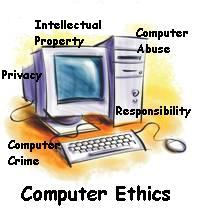In my opinion, I consider computer abuses as computer crimes when these abuses have gone far beyond the laws of the local or national (or even international) government. Computer crimes are unethical and have broken privacy issues as much as computer abuses. In addition, these involve theft, copyright infringement, and pornography using the information communications technology.
2. Give an example of a computer crime not stated in the Computer Ethics blog. (http://cs192computerethics.blogspot.com)
One example of a computer crime is Cyberstalking. The perpetrator uses the information communications technology to stalk the victim in a way that he invades the privacy of his victim.
Some methods would include gathering personal information about the victim, from social networking sites or even email messages. Most cyberstalkers intend to defame their victim such as creating fake profiles in the name of the victim and claims that are usually degrading to the victim. In some cases, cyberstalkers would blackmail their victims and ask them for money or return of personal affections and the like.
Cyberstalking is very much a computer crime because it is closely related to real life hostage taking and hold-up cases.
3. Visit this site. http://www.crime-research.org/news/09.07.2008/3443/
This is the site that features the first Hacking crime being filed in the Philippines.
Question:
What is state in section 33a of Republic Act 8792?
It is stated there that going through sensitive information of a computer system/server using unauthorized access, without the knowledge and consent of the owner, with the pursuit of altering, stealing or destroying the information or server is punishable with a fine of P100,000.00 or 6 months to 3 years imprisonment.
This includes unauthorized hacking and introducing viruses to the system resulting to the corruption, destruction, alteration, theft or loss data within the server.
4. In Visayas State University, there is an office that deals with protecting the Intellectual Property Rights (IPR) of thos who publish their intellectual output works. What is this office that caters with IPR concerns? Who is the head of this office?
The Office of the Director for Research and Extension or more known as ODREx handles the Intellectual Property Rights of intellectual output works of the university. Specifically, it is in the Intellectual Licensing Office (ILO) where they deal with these concerns. The head of ODREx is Dr. Othello Capuno, the VP for research and extension.



